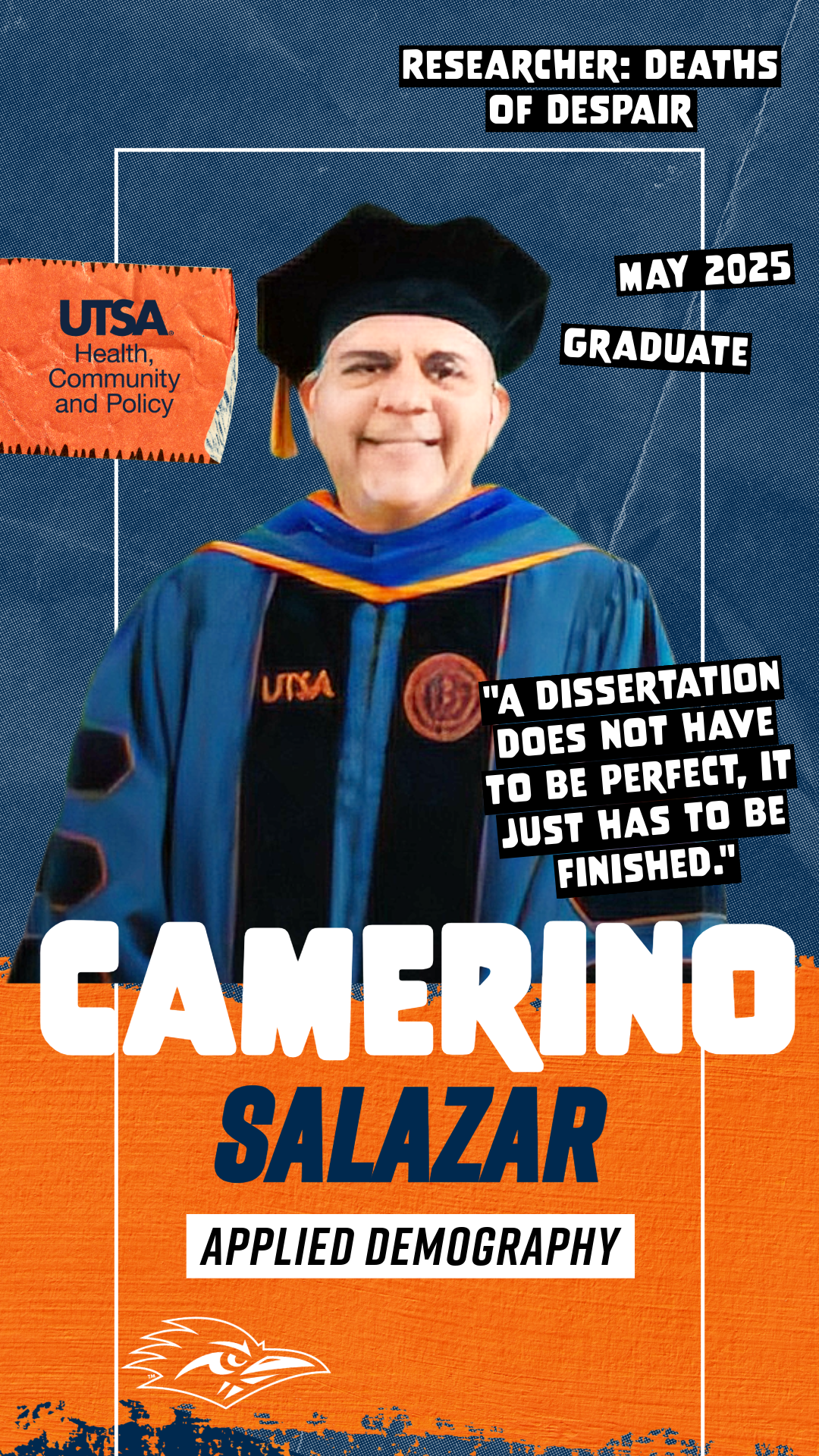Posted on May 13, 2025 by Amanda Cerreto

Camerino I. Salazar has earned a Ph.D. in Applied Demography, a cumulation of years of research and work. He plans to publish his dissertation, continue his research, and return to teaching.
What made you decide to attend UTSA?
 I had spoken with Drs. Johnelle and Corey Sparks about my interest in the demography program. Both of their encouragements were instrumental in my decision to apply. I was drawn to the type of faculty who not only excelled in their field but also took an active interest in their students' success—especially those balancing full-time careers with academic pursuits. Their understanding of the challenges faced by working professionals pursuing advanced degrees made me confident that UTSA was the right place to develop my research interests.
I had spoken with Drs. Johnelle and Corey Sparks about my interest in the demography program. Both of their encouragements were instrumental in my decision to apply. I was drawn to the type of faculty who not only excelled in their field but also took an active interest in their students' success—especially those balancing full-time careers with academic pursuits. Their understanding of the challenges faced by working professionals pursuing advanced degrees made me confident that UTSA was the right place to develop my research interests.
I also want to acknowledge the support of several individuals I had the privilege of working with, as well as mentors who helped shape my decision to apply. In particular, Theresa De La Haya and Dr. Virginia Mika played an important role in encouraging me to pursue this path. Their mentorship and belief in my potential gave me the confidence to take this next step.
What made you choose your major?
At the heart of my interest in demography is my background in social sciences. Throughout my career, I have consistently used data to convey conditions, understand circumstances, and highlight outcomes. Demography allowed me to deepen that understanding and apply it in meaningful ways, particularly in addressing disparities and analyzing trends in health and community well-being. It felt like a natural extension of my work in public health and policy.
What has been your favorite moment/experience at UTSA?
One of the highlights of my time at UTSA was co-authoring a paper with Dr. Ying Huang on the burden of opioid deaths in Texas. It was a rewarding experience not only to contribute to the academic understanding of this critical issue but also to see our work resonate outside of academia through an opinion piece. Being able to bridge research and public discourse was incredibly fulfilling, as it brought attention to pressing health challenges in our communities.
How did your degree shape your future goals?
My degree solidified my commitment to using data to drive change, particularly in the area of public health and policy. It also enhanced my ability to critically assess complex demographic trends and communicate those findings effectively. Moving forward, I am more equipped to contribute to research that informs decision-making and promotes equity in health outcomes.
What accomplishment are you most proud of from your time in college?
I am most proud of completing my dissertation, "Trends and Disparities in Deaths of Despair in Texas, 2000 to 2020," while balancing a full-time career and family responsibilities. This research was not only a culmination of years of study but also a deeply personal commitment to understanding the socio-economic factors that impact life expectancy in my home state.
What was the biggest challenge you faced during your college years, and how did you overcome it?
The biggest challenge I faced was balancing my professional career, family responsibilities, and the rigorous demands of my degree. Late nights and early mornings became the norm, but I was incredibly fortunate to have a strong support system that encouraged me every step of the way. I am especially grateful to Dr. Johnelle Sparks and Dr. Ying Huang for their unwavering guidance and encouragement—they truly helped me stay on track and remain focused on my goals.
My family’s understanding and my colleagues' encouragement also played a crucial role in helping me navigate even the most demanding moments. I am deeply thankful to my wife, Jennifer, and my children, Olivia and Mateo, whose love and patience made this journey possible. Their support was not only my greatest motivation but also a constant reminder of why I pursued this path.
If you could give advice to incoming students, what would it be?
For someone entering the program, I would definitely recommend identifying a research topic early. For me, it was by the second semester that I really began to focus on what would eventually become my dissertation on "Deaths of Despair." But even more important than finding the topic is working closely with faculty and finding a research mentor who can guide your interests and challenge your thinking. That support is invaluable in navigating the demands of graduate research.
If your years at UTSA had a theme song, what would it be?
I would say "Eye of the Tiger" by Survivor. It captures the resilience and perseverance required to juggle family, career, and doctoral studies.
What’s your go-to comfort food for stressful study sessions?
Anything sweet! Whether it's a slice of cake, a warm cookie, or a piece of chocolate, I find that a little bit of sugar goes a long way in keeping me focused and motivated during those long study sessions.
What surprised you the most about college life?
What surprised me the most was the incredible sense of community and support among fellow students and faculty. Even in a rigorous program, there was always a willingness to help each other succeed. I would also like to give a special shout-out to other demography students who have completed their programs, including Candace Jennings, Cristina Martinez, Adolph Delgado, and Joshua Reyna. These are some of the colleagues I connected with during my time at UTSA, and their dedication and accomplishments continue to inspire me.
How do you want to use your degree to make a difference in your community or field?
I want to use my degree to inform public health policies that address disparities and improve health outcomes in vulnerable communities. Demography provides critical insights into population trends and health inequities, guiding data-driven solutions that lead to measurable improvements. Through research and teaching, I hope to contribute to policies that reflect the needs of diverse populations.
If you had to sum up your college experience in three words, what would they be?
Resilience, Community, Purpose.
What’s one piece of advice that you received during college that you’ll carry with you?
“A dissertation does not have to be perfect; it just has to be finished.” That simple advice helped me push through moments of doubt and focus on progress rather than perfection.

